-
February 22, 2013 ECAM (Calle Juan de Orduña, 3. Ciudad de la Imagen. 28223 Pozuelo de Alarcón, Madrid)
Eduardo Coutinho. Masterclass
Time: 12 noon
The filmmaker looks back at his work, which he has built over the years with the idea that documentary is always a marginalized genre. On the one hand, in the sense of it being a minor genre that is usually side-lined with respect to fiction film; and on the other hand, because of its ability to merge with an idea about reality and the subject that is very distinct from the resources of deception and idealization that characterise fiction film.
Presented and moderated by Sergio Oksman
-
February 23 and March 11, 2013 Sabatini Building, Auditorium
Cabra marcado para morrer
1984, colour/BW, 116’. Screening format: 35mm and DVD
Time: 7 p.m.
*February 23: Encounter with Eduardo Coutinho and Berta SichelAt the beginning of the 1960s, the peasant leader João Pedro Teixeira was killed by order of the landowners of north-eastern Brazil. Coutinho decided to make a film about his life, starring the peasants themselves, but he had to stop filming because of the military coup that took place in 1964. Seventeen years later he returned to the project, seeking out Teixeira's widow and ten children, and examining the lives of each of them during the long years of the military regime.
-
February 27 and March 20, 2013 Sabatini Building, Auditorium
Santa Marta – Duas semanas no morro and Boca do Lixo
Time: 7 p.m.
Santa Marta – Duas semanas no morro
1987, colour, 54’. Screening format: DVD
and
Boca do Lixo. 1993, colour, 49’. Screening format: Blu-ray
Coutinho and his crew spent two weeks in Morro Santa Marta, a favela in the southern part of Río de Janeiro, filming the daily lives of its inhabitants. Religiosity, music, violence, racism and the dreams of young people are treated with the sensitivity characteristic of Coutinho's interviews.
Boca do Lixo reveals the extreme economic inequalities existing in Brazil, with its portrayal of the waste pickers of the region of São Gonçalo, 40km from Río de Janeiro. There, the lack of any real employment opportunity leads many families to try to make a living from garbage, in deplorable conditions.
-
March 1 and March 21 Sabatini Building, Auditorium
Santo Forte
1999, colour, 49’. Screening format: DVD
Time: 7 p.m.
In the time elapsing between the Pope's visit to Río de Janeiro and, a few months later, the festivities of the Christmas season, Coutinho interviews Catholics, Evangelicals and practitioners of Umbanda, all from a favela in Rio. They talk about their communication with the supernatural through intervention by saints, deities or orishas.
-
March 2 and April 1 Sabatini Building, Auditorium
Babilônia 2000
2000, colour, 80’. Screening format: DVD
Time: 7 p.m.
Babilônia 2000, a documentary filmed on the last day of 1999, shows the preparations underway for New Year's Eve in the favelas Chapéu Mangueira and Babilônia. With over 4000 inhabitants, these are the only favelas located on the edge of Copacabana Beach where, at midnight, nearly one million people gather to watch the fireworks and celebrate. The people in the film talk about their expectations for the year 2000.
-
March 6 and April 3 Sabatini Building, Auditorium
Edifício Master
2002, colour, 110’. Screening format: DVD
Time: 7 p.m.
Over a period of seven days, a film crew recorded the lives of the residents of Edifício Master, an apartment building located one block from Copacabana Beach. The building has 12 floors and 23 units on each floor, with a total of almost 500 residents. Thirty-seven of these residents share their life stories, opening the doors to their homes and their private lives for the cameras.
-
March 7 and April 4 Sabatini Building, Auditorium
Peões
2004, colour, 85’. Screening format: DVD
Time: 7 p.m.
Documentary about the former metallurgical workers of the ABC Region of São Paolo, who took part in the strikes of the 1980s along with Luiz Inácio Lula da Silva. They talk about their origins, their participation in the workers' rights movement, their lives since then and their personal vision of the Lula government.
-
March 9 and April 5 Sabatini Building, Auditorium
O Fim e o Princípio
2005, colour, 110’. Screening format: DVD
Time: 7 p.m.
Coutinho and his crew travel to the inland areas of Paraíba – in north-eastern Brazil – in search of people who have a story to tell. Thanks to the mediation of a young man from the region, the inhabitants (mostly elderly people) talk about their lives, marked by popular Catholicism, hierarchy, the sense of family and honour - reflecting a world that has almost disappeared.
-
March 13 and April 6 Sabatini Building, Auditorium
Jogo de Cena
2007, colour, 106’. Screening format: DVD
Time: 7 p.m.
Responding to a newspaper ad, eighty-three women came to a film studio to tell their life-stories. Coutinho selected twenty-three of these testimonies and sent them to well-known Brazilian actresses who had been chosen to interpret these women's stories.
-
March 15 and April 8 Sabatini Building, Auditorium
Moscou
2009, colour, 78’. Screening format: DVD
Time: 7 p.m.
A film of the rehearsing process of Anton Chekhov's work The Three Sisters by the theatre group Galpão, directed by Enrique Díaz. The film includes fragments of workshops, improvisations and rehearsals of a play that did not, and never will, have a premiere.
-
March 16 and April 12 Sabatini Building, Auditorium
As Cançoes
2011, colour, 94’. Screening format: DVD
Time: 7 p.m.
Eduardo Coutinho and his crew go in search of ordinary people in downtown Río Janeiro, asking them to talk and sing the songs that have marked their lives. At the end, an interview with 42 people in a theatre, who tell stories related to those songs.
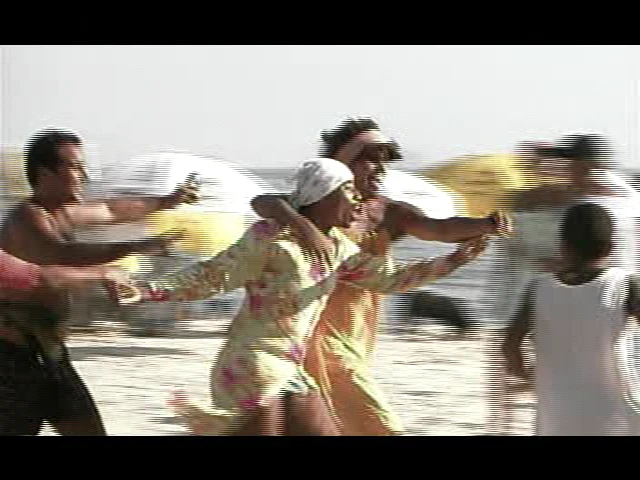
Held on 22, 23, 27 Feb, 01, 02, 06, 07, 09, 11, 13, 15, 16, 20, 21 Mar, 01, 03, 04, 05, 06, 08, 12 Apr 2013
Eduardo Coutinho (São Paulo, 1933) is an essential name in Latin American documentary film. His work is shaped by political issues but manages to avoid propaganda, as he addresses the everyday lives and the subjectivities of marginal majorities with a sensibility not altered by melodrama. Coutinho has performed his professional activity in several fields, including law, theatre, and both print and television journalism. His first contact with film occurred when he was the editor of the magazine Visão. His work with the television staff of Globo Repórter, for decades the most popular documentary program in Brazil, enabled him, despite the censorship in place at the time, to conduct in-depth documentation on numerous topics: the drought and the harshness of agricultural work, the banditry plaguing the north-eastern part of the country, the lives of public figures, such as Colonel Teodorico Bezerra and the painter Cándido Portinari, among others.
After the success of his documentary Cabra marcado para morrer (1984), highly praised by critics all over the world (and the winner of the Grand Coral, the top prize at the Havana Film Festival as well as the Golden Toucan in Río de Janeiro), Coutinho left the staff of Globo Repórter to work in the production of video documentaries and to write scripts for series made by TV Manchete. At the same time, he made his own documentaries, creating works such as O Fio da Memória which, coinciding with the centennial of the abolition of slavery, analyses the presence of black people in Brazilian culture and history. Other films of his include Boca do Lixo, Santa Marta-duas semanas no Morro, O Jogo da Dívida and Romeiros do Padre Cícero. Starting in 1999, Coutinho returned to feature-length films in digital video (later transferred to 35 mm) and he directed films such as Santo Forte, Babilônia 2000, Edifício Master, Jogo de cena and As Cançoes.
Coutinho's cinema has been defined by Consuelo Lins from the perspective of "the ethics of cruelty" but not in the sense of maintaining or showing suffering, but rather in that of rejecting complacency in his relationship with the subjects or situations he shows throughout his filmmaking career.
Distributed by
Videofilmes, Brasil
35 mm copy of Cabra marcado para morrer from the Cinemateca Brasileira
Organised by
Museo Reina Sofía
In collaboration with
Festival Punto de Vista, the Embassy of Brazil, Spanish-Brazilian Culture Foundation and ECAM (Film and Audiovisual School of the Community of Madrid)
Curatorship
Berta Sichel
Más actividades

Difficulty. Forms and Political Effects of Deviation in Writing and Contemporary Art
23 February – 14 December 2026 – Check programme
Difficulty. Forms and Political Effects of Deviation in Writing and Contemporary Art is a study group aligned towards thinking about how certain contemporary artistic and cultural practices resist the referentiality that dominates the logics of production and the consumption of present-day art. At the centre of this proposal are the concepts of difficulty and deviation, under which it brings together any procedure capable of preventing artistic forms from being absorbed by a meaning that appears previous to and independent from its expression. By ensuring the perceptibility of their languages, difficulty invites us to think of meaning as the effect of a signifying tension; that is, as a productive and creative activity which, from the materiality of art objects, frees aesthetic experience from the representational mandate and those who participate in it from the passiveness associated with tasks of mimesis and decoding.
The economy of the referential norm translates the social logic of capitalism, where insidious forms of capturing subjectivity and meaning operate. In the early 1980s, and adopting a Marxist framework, poet Ron Silliman highlighted how this logic entailed separating language from any mark, gesture, script, form or syntax that might link it to the conditions of its production, rendering it fetichised (as if without a subject) and alienating its users in a use for which they are not responsible. This double dispossession encodes the political strategy of referential objectivity: with no subject and no trace of its own consistency, language is merely an object, that reality in which it disappears.
The political uses of referentiality, more sophisticated today than ever before, sustain the neoliberal-extractivist phase of capitalism that crosses through present-day societies politically, economically and aesthetically. Against them, fugitive artistic practices emerge which, drawing from Black and Queer studies and other subaltern critical positions, reject the objective limits of what exists, invent forms to name what lies outside what has already been named, and return to subjects the capacity to participate in processes of emission and interpretation.
Read from the standpoint of artistic work, the objective capture of referentiality may be called transparency. Viewed from a social contract that reproduces inequality in fixed identity positions, transparent in this objectivity are, precisely, the discourses that maintain the status quo of domination. Opposite the inferno of these discourses, this group aims to collectively explore, through deviant or fugitive works, the paradise of language that Monique Wittig encountered in the estranged practices of literature. For the political potency of difficulty — that is, its contribution to the utopia of a free language among equals — depends on making visible, first, its own deviations; from there, the norm that those deviations transgress; and finally, the narrowness of a norm which in no way exhausts the possibilities ofsaying, signifying, referring and producing a world.
From this denouncement of referential alienation, fetishisation and capture, Difficulty. Forms and Political Effects of Deviation in Writing and Contemporary Art turns its attention to the strategies of resistance deployed by contemporary artists and poets. Its interest is directed towards proposals as evidently difficult or evasive as those of Gertrude Stein, Lyn Hejinian, Theresa Hak Kyung Cha, Kameelah Janan Rasheed, Kathy Acker, María Salgado and Ricardo Carreira, and as seemingly simple as those of Fernanda Laguna, Felix Gonzalez Torres and Cecilia Vicuña, among other examples that can be added according to the desires and dynamics of the group.
The ten study group sessions, held between February and December, combine theoretical seminars, work with artworks from the Museo Reina Sofía’s Collections and exhibitions, reading workshops and public programs. All these formats serve as spaces of encounter to think commonly about certain problems of poetics — that is, certain political questions — of contemporary writing and art.
Difficulty. Forms and Political Effects of Deviation in Writing and Contemporary Art inaugurates the research line Goodbye, Representation, through which the Museo Reina Sofía’s Studies Directorship seeks to explore the emergence of contemporary artistic and cultural practices which move away from representation as a dominant aesthetic-political strategy and redirect their attention toward artistic languages that question the tendency to point, name and fix, advocating instead for fugitive aesthetics. Over its three-year duration, this research line materializes in study groups, seminars, screenings and other forms of public programming.

CLINIC 2628. A Community of Writing and Research in the Arts
February – October 2026
Clinic 2628 is a project which supports and brings together writings which stem from the intention to offer a space and sustainable time for research work in art and culture. Framed within an academic context which is increasingly less receptive to the forms in which thinking happens and is expressed, the aim is to rescue the academic from its neoliberal trappings and thus recover the alliance between precision and intuition, work and desire. A further goal is to return writing to a commons which makes this possible through the monitoring of processes and the collectivisation of ideas, stances, references and strategies.
The endeavour, rooted in a collaboration between the Museo Reina Sofía’s Studies Directorship and the Artea research group, via the i+D Experimenta project, is shaped by three annual editions conceived as spaces of experimentation, discussion and a demonstration of writings critical of what is put forward by today’s academia.
What forces, forms and processes are at play when writing about art and aesthetics? In academia, in museums and in other cultural institutions, the practice of writing is traversed by productivist logics which jeopardise rhythms of research and experimentation. The imposition of both scientism inherent in the structure of “the paper” and the quantifying of results which demand a criterion of quality and visibility sterilise and smoothen, from the outset, the coarseness that is particular to writing understood from the concrete part of language: phonic, graphic, syntactic and grammatical resistance connecting the language user to the community the language unites and activates. They also sterilise the roughness enmeshed in the same desire to write, the intuitive, clear and confusing pathways that once again connect the writer to those reading and writing, participating in a common good that is at once discovered and produced.
The progressive commercialisation of knowledge propelled by cognitive capitalism moves further away from the research and production of knowledge in artworks and artistic languages and practices. The work of curators and archive, criticism, performances and essays formerly saw a horizon of formal and emotional possibilities, of imagination that was much broader when not developed in circumstances of competition, indexing and impact. Today, would it be possible to regain, critically not nostalgically, these ways; namely, recovering by forms, and by written forms, the proximity between art thinking and its objects? How to write in another way, to another rhythm, with no more demands than those with which an artwork moves towards different ways of seeing, reading and being in the world?

Cultural Work
Thursday, 12 February 2026 – 5:30pm
This series is organised by equipoMotor, a group of teenagers, young people and older people who have participated in the Museo Reina Sofía’s previous community education projects, and is structured around four themed blocks that pivot on the monstrous.
Session number two looks to approach film as a place from which cultural work is made visible and processes of production engage in dialogue with artistic creation. From this premise, the session focuses on exploring how audiovisual content is produced, assembled and distributed, from the hands that handle the images to the bodies that participate in its circulation. The aim is to reflect on the invisible effort, precarity and forms of collaboration that uphold cultural life, that transform the filmic experience into an act that recognises and cares for common work.
![Basel Abbas y Ruanne Abou-Rahme, At Those Terrifying Frontiers Where the Existence and Disappearance of People Fade Into Each Other [En esas fronteras aterradoras donde la existencia y la desaparición de personas se disuelven entre sí], 2019](https://recursos.museoreinasofia.es/styles/small_landscape/public/Colecci%C3%B3n/abbasabourahme.png.webp)
Gaza and Aestheticide
Tuesday February 10, 2026 – 16:00 h
This seminar examines the systematic destruction of Palestinian collective sensibility — what we might call “aestheticide” — that has accompanied Israel’s genocide and ecocide in Gaza, and considers the conditions of artistic practice in its aftermath. Over more than two years, the demolition of universities, archives, museums, and libraries has not only erased cultural and intellectual infrastructure but has also targeted the very possibility of representation itself. The destruction of a people has been accompanied by the destruction of their image, their history, and their capacity to be known: reportage, scholarship, and cultural memory have been deliberately undermined, with media institutions, universities, and museums often complicit in this repression. Gaza consequently functions as a rehearsal space for a possible global future — of fascism, post-liberal authoritarianism, militarized borders, and AI-enabled warfare —, a laboratory for an emerging world order. What, then, becomes of critical analysis and resistance under these conditions? And what becomes of aesthetics and politics?
This three-hour seminar engages in dialogue with a broader line of work on the climate emergency and decolonial perspectives developed within the Museum of the Commons project (2023–2026) of the L’Internationale network, of which the Museo Reina Sofía is a member; as well as with some of the questions that animate the study group Aesthetics of Peace and Desertion Tactics. Finally, it is also embedded in a wider strategy of support for and commitment to the artistic and discursive practices of Palestinian artists and cultural practitioners, most clearly reflected in the TEJA network.
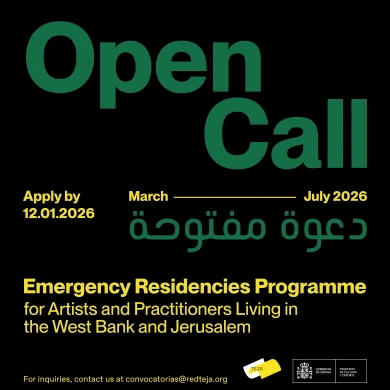
TEJA 2026. Open Call for Emergency Art Residencies
Proposal submission until 12 January, 2026
TEJA / Red de espacios culturales en apoyo a situaciones de emergencia [Network of Cultural Spaces in Support of Emergency Situations] has the mission to promote transnational cooperation by offering temporary art residencies to artists and cultural practitioners who find themselves in complex socio-political situations in their countries of origin. During their stay in Spain, residents receive accommodation, legal and psychological counseling, and access to a network of organizations and professionals with whom they can share, develop, and continue with their creative projects. The goal is to provide a safe and stimulating environment where artists can continue their work despite adverse circumstances and generate dialogue spaces that ensure freedom of expression through joint activities both in Spain and with international collaborators.
During 2026, TEJA hosts three new residencies, each lasting three months, dedicated to supporting artists and cultural practitioners residing in the West Bank and Jerusalem. In addition, in the second half of the year, TEJA hosts three additional residencies for Gazan artists, which are offered by invitation (as Spain is currently unable to facilitate evacuations from Gaza, these invitations are coordinated through France). These residencies aim to provide a stable, creative environment and foster artistic exchange in the face of ongoing adversities. Through this new program, TEJA reaffirms its commitment to amplifying Palestinian voices and empowering artists as they navigate these turbulent times.
The selection is carried out by the TEJA network in close collaboration with each hosting partner. This year the hosting partners are: La Escocesa (Barcelona), hablarenarte / Planta Alta (Madrid), Espositivo (Madrid), Institute for Postnatural Studies (Madrid), Casa Árabe (Córdoba). The selection prioritizes the artist’s personal and professional situation first, and then the alignment with the practices and themes of the hosting spaces. Proposal submission deadline is January 12th, 2026, 23:59 h.
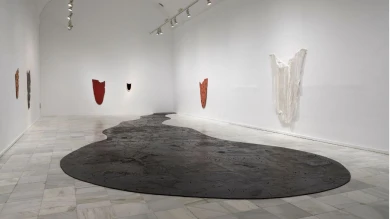
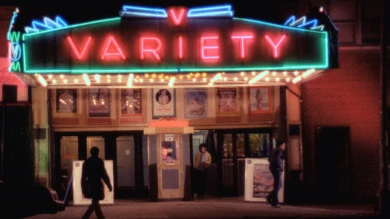
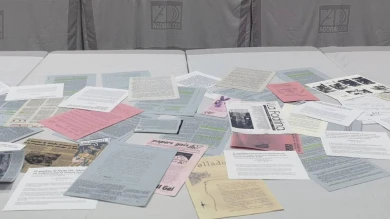
![Miguel Brieva, ilustración de la novela infantil Manuela y los Cakirukos (Reservoir Books, 2022) [izquierda] y Cibeles no conduzcas, 2023 [derecha]. Cortesía del artista](https://recursos.museoreinasofia.es/styles/small_landscape/public/Actividades/ecologias_del_deseo_utopico.jpg.webp)
![Ángel Alonso, Charbon [Carbón], 1964. Museo Reina Sofía](https://recursos.museoreinasofia.es/styles/small_landscape/public/Actividades/perspectivas_ecoambientales.jpg.webp)